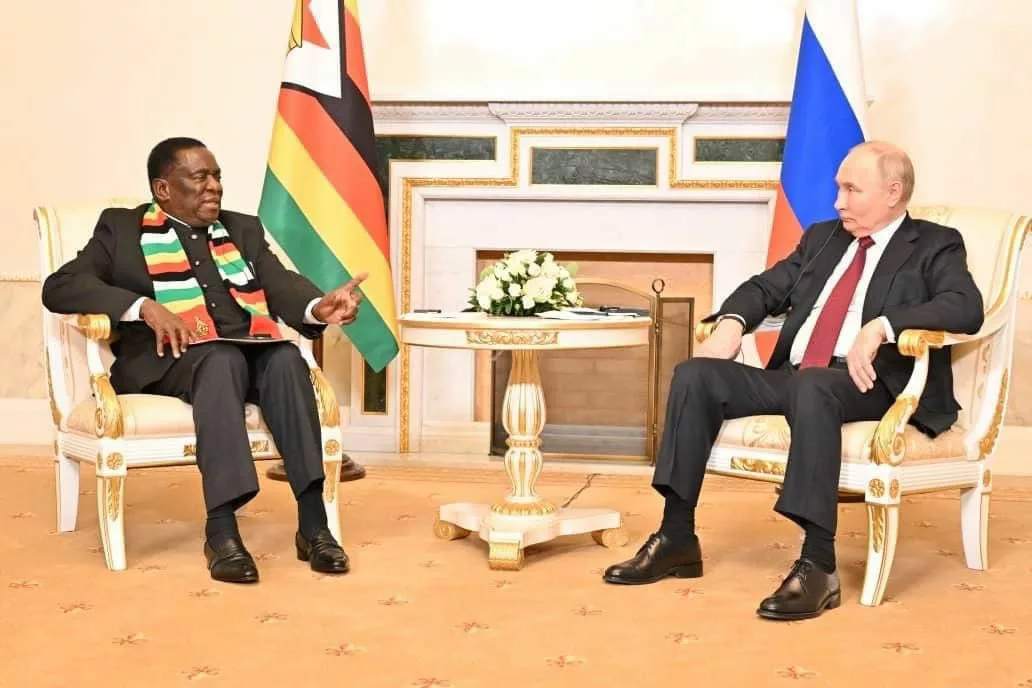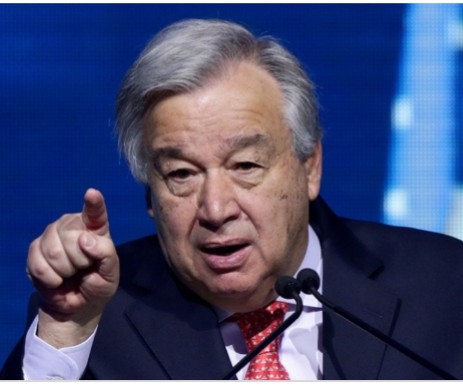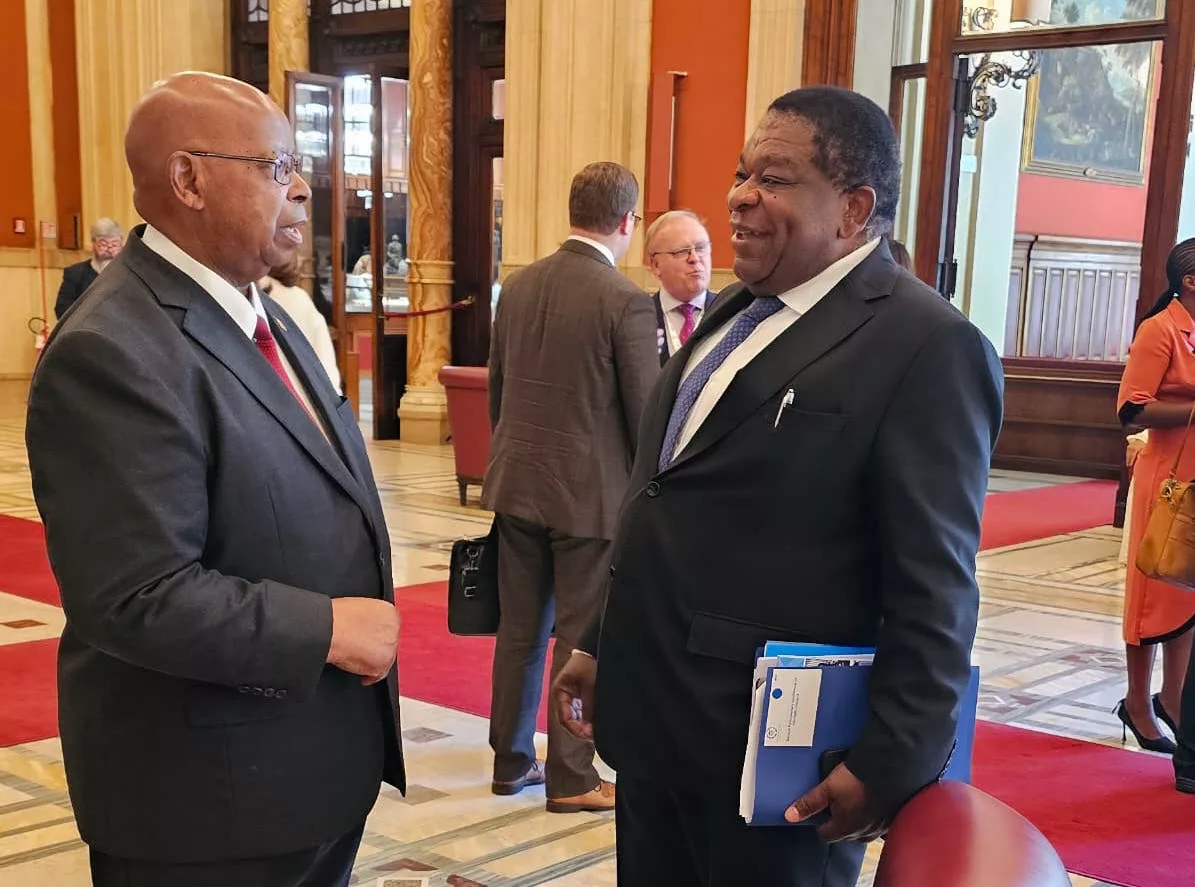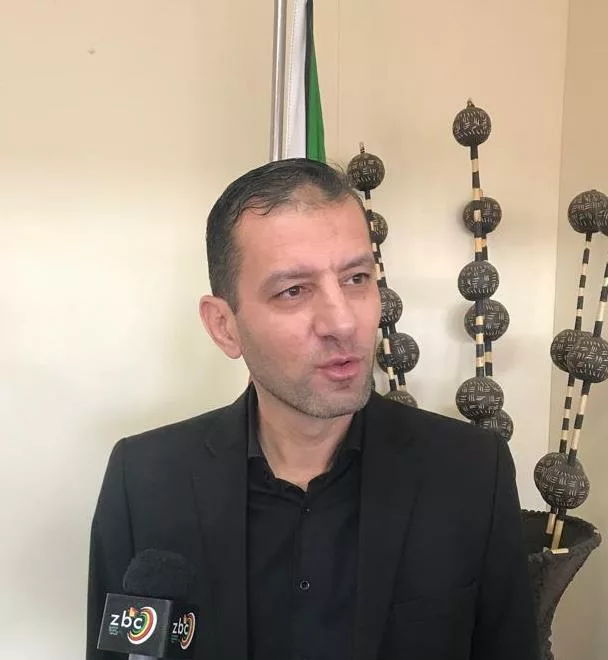|
Getting your Trinity Audio player ready...
|
Writes Anyway Yotamu
World leaders came together in Switzerland in early June in a show of support for Ukrainian President Volodymyr Zelenskyy’s 10-point peace plan and to apply pressure on Russia to end the war against Ukraine.
Zelenskyy saw the much-subscribed attendance as a success and expressed hope that declarations stemming from the talks would shape the peacemaking process.
“I believe that we will witness history being made here at the summit. May a just peace be established as soon as possible,” Zelenskyy said on the first day of the two-day summit, which drew more than 90 countries.
“Ukraine never wanted this war. It’s a criminal and absolutely unprovoked aggression by Russia,” he said at a news conference alongside Swiss President Viola Amherd, who said the conflict had brought “unimaginable suffering” and violated international law.
The summit communique blames Russia’s war in Ukraine for large-scale human suffering. It also makes three points:
– Ukraine’s nuclear power plants “including Zaporizhzhia Nuclear Power Plant, must operate safely and securely under full sovereign control of Ukraine.”
– The world’s food security depends on “free, full and safe commercial navigation, as well as access to seaports in the Black and Azov Seas.
– Attacks on merchant ships in ports and along the entire route, as well as against civilian ports and civilian port infrastructure, are unacceptable.
– All prisoners of war must be released and “all deported and unlawfully displaced Ukrainian children, and all other Ukrainian civilians who were unlawfully detained, must be returned to Ukraine.”
US Pledge Support Aid To Ukraine
U.S. Vice President Kamala Harris stood in for President Joe Biden at the Ukraine Peace Summit. During a meeting with Zelenskyy, Harris pledged America’s unwavering support for Ukraine and announced more than $1.5 billion in aid for Ukraine’s energy infrastructure and its humanitarian needs after Russia’s 27-month invasion
“This war remains an utter failure for [Russian President Vladimir] Putin,” Harris said. “It is in our interest to uphold international norms.”
The $1.5 billion pledge includes $500 million in new funding for energy resources and the redirecting of $324 million in previously announced funds toward emergency energy infrastructure repairs and other needs in Ukraine, the vice president’s office said.
Harris also announced more than $379 million in humanitarian assistance from the U.S. State Department and the U.S. Agency for International Development to help refugees and others affected by the war
On the eve of the summit, Putin offered terms to end the war: Ukraine must drop its ambition to join NATO and give up the four provinces Russia now claims: Donetsk, Luhansk, Zaporizhzhia, and Kherson.
Russia-Ukraine War, Wagner And The Influence on Africa
Wagner Group leader Yevgeny Prigozhin, who had been Putin’s henchman in Africa since Wagner began its operations on the continent in 2017, died after his private jet crashed about an hour after taking off in Moscow in August 2023.
The focus of Wagner, now renamed Africa Corps by Russia’s defence ministry, is the deployment of paramilitary forces, running disinformation campaigns, and propping up influential political leaders.
After Prigozhin’s death, the Russian ministries of foreign affairs and defence didn’t hesitate to reassure Middle Eastern and African countries that the status quo would be maintained, meaning unofficial Russian soldiers on the ground would continue to operate in these regions as the group’s activities in Africa are now under the direct supervision of the Russian ministry of defence
Zimbabwean International Relations Expert, Tendai Ruben Mbofana says Russia’s increased involvement in African affairs is worrisome
“So you’ll find that, that is where the Russians started, you know, imprinting their footprints on Africa, actually even thinking deeper, they are roots in African affairs. After the fall of the Soviet Union in 1991, we did see a bit of a reduction, actually not even a bit, a significant reduction in Russia’s participation in African affairs. Actually, 10 years later, we saw the Chinese just coming in full force when China had become a global power. And Russia was taking more of a big seat, but of late, we have seen the Russians coming back,” he said
“So that’s why we even had, we have these Russia-Africa summits, or they said, bitters-based international, economic forum, and so forth. It’s a clear sign that Russia now wants to re-asset its previous dominance, in post-independence Africa, because all those parties that I mentioned once they took power, they were largely under the direction of the Russians. So that’s where even such, but it’s now a bit difficult for Russia to re-asset itself, because during that time from 1991, when the Soviet Union broke down and there was that gap left, that vacuum left, and the Chinese came in, now for the Russians to just come back in, it’s quite hard.”
He said Russians are “finding that the spaces have already been taken by the Chinese so they have to come up with other plans”.
“That’s where we find such groups as the Wagner Group, or the Corps, they’re coming in, because it’s like they’re now trying to come in through the way of violence,” Mbofana said.
“Of course, the Wagner Group is more of a militia than anything else. They’re not coming in through proper negotiations, bilateral agreements, multilateral agreements, and so forth, they’re coming in, you know, like taking over. We saw that in Mali and other countries where they managed to push for these countries to kick out the French so that they can be replaced by the Russians.”
He said the continent is witnessing an increase in the push for Russian influence.
“So, going to your question about our own countries here in the region, like Zambia, Zimbabwe, DRC, Mozambique, and so forth, we are seeing a bit of an increase in the push for Russian influence to come in. Right now, we did watch President Mnangagwa groveling, and just listening to whatever he was saying to Putin a few days back, you could see that he was actually begging for Russia’s support and Russian aid to come here,” Mbofana said.
“And we did see earlier this year, Russian donating grain and a couple of helicopters to Mnangagwa.”
Russia Hosts St. Petersburg International Economic Forum
In the first week of June, Russia hosted the 27th St. Petersburg International Economic Forum (SPIEF) attended by over 120 countries, among them Zimbabwe, where President Vladimir Putin revealed that the development of relations with African countries is Moscow’s priority.
During a meeting with Putin on the sidelines of the SPIEF, Zimbabwe’s President Emmerson Mnangagwa, told the Russian leader that the west was consolidating its power in Zambia while his country was being ignored, remarks which have unsettled Zambian and other regional countries who feel the Zimbabwean leader’s comments were meant to appease Putin in his quest for financial and military support.
Mnangagwa, in Russia for the St Petersburg International Economic Forum, was not aware his discussions with Putin would be released to the media, his spokesman George Charamba defended his boss:
Mnangagwa appealed for military support from Putin, as well as food, as he appeared to mark Zambia as a country that was “entertaining” the West.
He invited Putin and Russia to “participate in our economy, especially in the mining sector and agriculture,” adding that “there is a lot that we can afford for you to participate. And in that process, the West will run away… We cannot go to the West; we have to come here because the West would want to see us down. They support our neighbours, Zambia and Malawi, very heavily.
“But in spite of that, Zimbabwe’s economic growth is the fastest growing economy in the region, in spite of us being isolated by the Americans.
He asked Putin for support, especially in the area of defence and security as well as food security.
Zimbabwe is assuming the chairmanship of SADC in August, to be marked by a summit in Harare.
Mnangagwa’s comments have since triggered a diplomatic incident with Zambia, whose reformist President Hichilema Hakainde swept to power in 2021.
Charamba said the assumption from the Zimbabwe delegation was that his conversation with Putin was private. The Kremlin, in fact, released a video and transcript of the meeting lasting just under a quarter of an hour.
Pictures released by the Kremlin also showed photographers present in the room, although it was unclear if they stayed through the meeting.
“As you can see from the set-up, this was a closed meeting in which the President of Zimbabwe was a guest. The recording was in-house to the host. Don’t ask me how it found its way into the public domain; I cannot assist you,” Charamba posted on his X account formerly Twitter.
However, Mngangagwa’s utterances have created tension between Zimbabwe and Zambia with the matter spilling into the latter’s Parliamentary debates in the past weeks.
In a ministerial statement, Mulambo Haimbe, Zambia’s Foreign Affairs and International Co-operation Minister, expressed concern over Mnangagwa’s remarks saying his country sees the comments as an “unwarranted attack on Zambia’s sovereignty”.
“It is in this context that we have sought the regional bodies’ urgent and immediate intervention in relation to the present and any other matters in seeming contention between Zimbabwe and ourselves,” said Haimbe
Asked what diplomatic steps Zambia has taken to ease the tension, Haimbe said they had reached out to Southern African Development Community (SADC) and the African Union (AU).
“We are part of a wider regional and continental family including SADC and the AU to whom we have already reached out for an intervention,” he said.
Haimbe said Mnangagwa’s remarks had the effect of spoiling good relations between the two countries which began in pre-colonial times when Zambia provided assistance, including military support to the Zimbabwean liberation movement and allowed our “brothers and sisters in the struggle to operate from Zambia”.
“It is against this backdrop that I wish to state in no uncertain terms that this demonstrates our commitment to the pursuit of neighbourly and peaceful relations between the two nations,” Haimbe said.
He said Mnangagwa’s remarks were not in sync with the warm relations that existed, hence Lusaka’s quest to have this “matter decisively and conclusively addressed”.
Relations between Zimbabwe and Zambia have been frosty after Harare accused Lusaka of trying to interfere with electoral processes following a damning report by the SADC Election Observer Mission (SEOM) that the August 23 elections had failed to meet regional and international standards on the holding of free and fair polls.
Ruling Zanu PF party official went into overdrive attacking the chair of SEOM, Nevers Mumba. The former Zambian vice president was appointed to chair SEOM by Zambia’s President Hakainde Hichilema in his capacity as the SADC Troika chair. Zanu PF has been accusing Hichilema and the United States of also supporting opposition members in Zimbabwe.
In turn, Lusaka accuses Zanu PF of also supporting opposition parties in Zambia. Haimbe said Zambia was, however, open to fostering and deepening relations “with like-minded, brotherly and sisterly nations.”
“Ours is to enhance economic diplomacy, peace, security, and stability in the region and beyond for the mutual benefit of our collective citizens,” he said.
“However, notwithstanding, Zambia remains a sovereign State whose sovereignty must be respected and will be protected.”
Young Africans In Russia’s Alabuga
Meanwhile, as Mnangagwa was doing the bidding for his country before Putin at the SPIEF, some Zimbabweans had been victims of an attack in Alabuga where a large number of young African youth have been employed to produce enemy drones.
The influx of youth into Alabuga comes amidst escalating tensions, as the area houses a facility for the licensed production of Iranian Shahed-series one-way attack drones, which are being used in the conflict against Ukraine. Russia has been accused of coercing young students into building drones for use in Ukraine. If confirmed, this could likely make the facility as well as the students working in it as a legitimate target for Ukraine.
Early May, the WSJ’s investigative report revealed that cellphone footage captured a Ukrainian unmanned aerial vehicle slowly winding toward its final destination in a new installment in the spreading drone wars, with a drone itself being used to hit a site where enemy drones were being made. This was in Alabuga, where young individuals from various African nations are converging seeking employment and education.
The Alabuga authorities announced that students from Rwanda, Sri Lanka, Ghana, Nigeria, Tanzania, Uganda, and Kenya were to embark on training for new professions and commence Russian language lessons. Of specific interest is also the fact that young women between the ages of 18 and 22 are the ones being recruited. Investigations have been launched to determine why the specific age range of young African women is the target.
With the Ukrainian drone strike on Alabuga just last month aimed at fighting back Russia’s waging war, the safety of the many young Africans in the area is uncertain.
The strike resulted in injuries to nine individuals and impacted a dormitory within the Alabuga SEZ. Tatarstan’s regional head, Rustam Minnikhanov, assured that there was no significant damage and that the enterprises’ operations continued uninterrupted.
But a report by RIA Novosti indicated that citizens from nine countries, including Russia itself, Zimbabwe, Rwanda, the Republic of Congo, Kenya, Nigeria, Kyrgyzstan, Sri Lanka, and South Sudan, were among the injured. This attack has drawn attention to the hundreds of students reportedly assembling Shahed drones at the Alabuga Polytechnic.
“I came to work and study at Alabuga Polytech in the field of Service and Hospitality. And I am going to work in Shokoladnitsa. I am fine now,” said Otieno Macrene Achieng, Alabuga Start program’s participant from Kenya, according to WSJ’s report. “Those who attacked our hostel today are real barbarians and they deserve serious condemnation. In my opinion, they wanted to intimidate us. But I want to tell you they did not succeed. You won’t scare me, because Alabuga is a strong place and we will get through this.”
Could this result in the recent tragedies witnessed where African students who were serving in prisons were recruited by then Wagner to fight in the Russia-Ukraine war? Memories are still too fresh about how Zambian student Lemekani Nyirenda and Tanzania’s Nemes Tarimo were both killed while fighting for Russia in Ukraine. What remains to be known is how many more of the young Africans have been drafted into the Ukraine war using Russia’s mercenary group.
This situation raises critical questions about the intersection of economic needs and geopolitical conflicts, as well as the ethical implications of such employment in war-torn regions in Russia and the involvement of young people in the war.
So far, Zimbabwe and other African governments whose citizens were injured in the Alabuga drone attack have not issued any specific public diplomatic response as African nations have largely maintained neutrality in the conflict.






